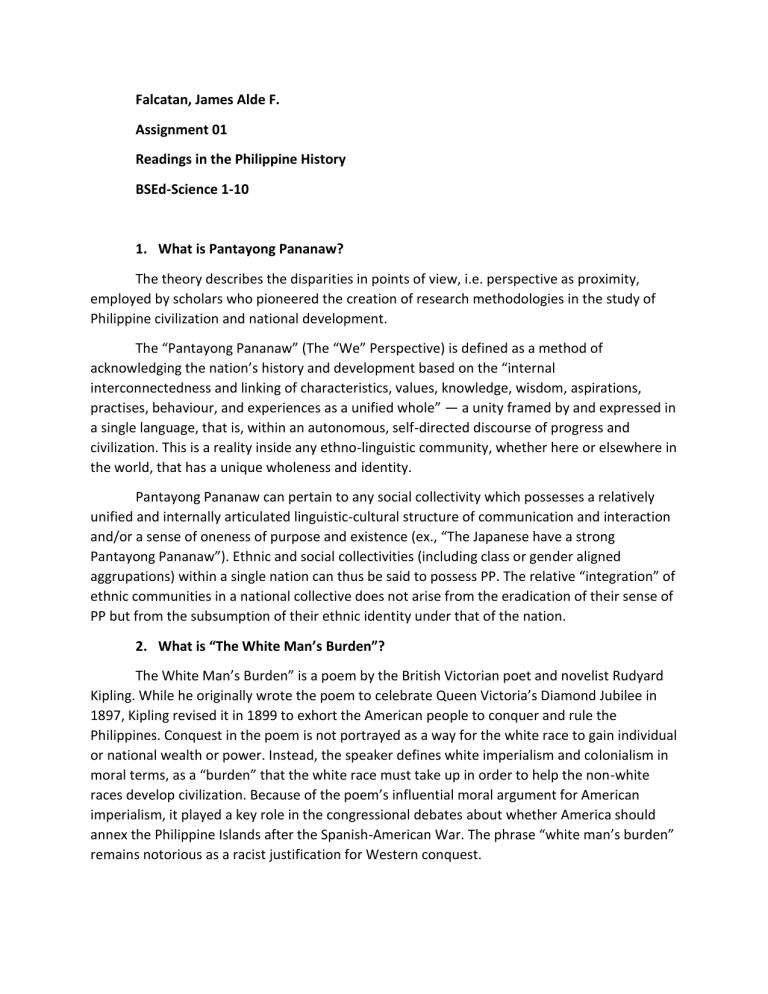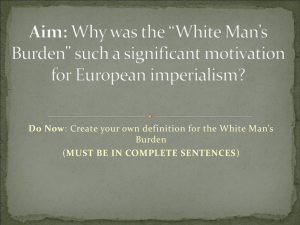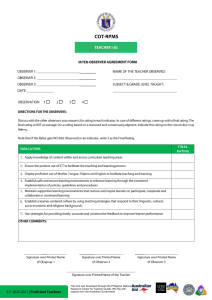
Falcatan, James Alde F. Assignment 01 Readings in the Philippine History BSEd-Science 1-10 1. What is Pantayong Pananaw? The theory describes the disparities in points of view, i.e. perspective as proximity, employed by scholars who pioneered the creation of research methodologies in the study of Philippine civilization and national development. The “Pantayong Pananaw” (The “We” Perspective) is defined as a method of acknowledging the nation’s history and development based on the “internal interconnectedness and linking of characteristics, values, knowledge, wisdom, aspirations, practises, behaviour, and experiences as a unified whole” — a unity framed by and expressed in a single language, that is, within an autonomous, self-directed discourse of progress and civilization. This is a reality inside any ethno-linguistic community, whether here or elsewhere in the world, that has a unique wholeness and identity. Pantayong Pananaw can pertain to any social collectivity which possesses a relatively unified and internally articulated linguistic-cultural structure of communication and interaction and/or a sense of oneness of purpose and existence (ex., “The Japanese have a strong Pantayong Pananaw”). Ethnic and social collectivities (including class or gender aligned aggrupations) within a single nation can thus be said to possess PP. The relative “integration” of ethnic communities in a national collective does not arise from the eradication of their sense of PP but from the subsumption of their ethnic identity under that of the nation. 2. What is “The White Man’s Burden”? The White Man’s Burden” is a poem by the British Victorian poet and novelist Rudyard Kipling. While he originally wrote the poem to celebrate Queen Victoria’s Diamond Jubilee in 1897, Kipling revised it in 1899 to exhort the American people to conquer and rule the Philippines. Conquest in the poem is not portrayed as a way for the white race to gain individual or national wealth or power. Instead, the speaker defines white imperialism and colonialism in moral terms, as a “burden” that the white race must take up in order to help the non-white races develop civilization. Because of the poem’s influential moral argument for American imperialism, it played a key role in the congressional debates about whether America should annex the Philippine Islands after the Spanish-American War. The phrase “white man’s burden” remains notorious as a racist justification for Western conquest. “The White Man’s Burden” presents the conquering of non-white races as white people’s selfless moral duty. This conquest, according to the poem, is not for personal or national benefit, but rather for the gain of others—specifically, for the gain of the conquered. The white race will “serve [their] captives’ need” rather than their own, and the white conquerors “seek another’s profit, / And work another’s gain.” Even if they do not recognize their benefit, the non-white races will be brought “(Ah, slowly!) toward the light,” escaping the “loved Egyptian night” in which they idled before their conquest. Yet the non-whites’ positive sentiment for their own “darkness” indicates the extreme difficulty whites will face in seeking to educate the conquered peoples.



